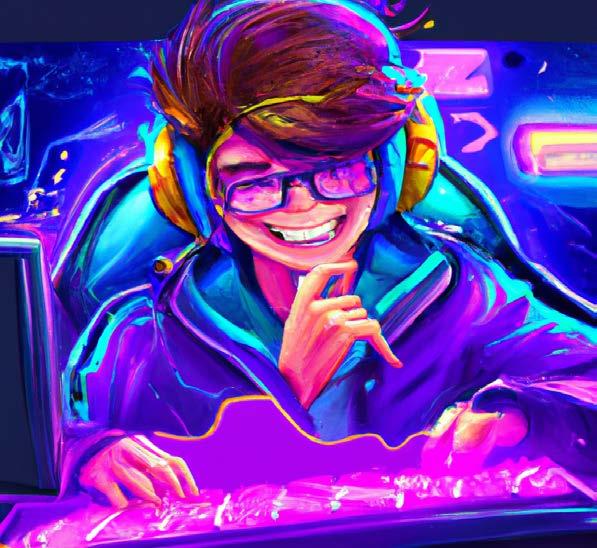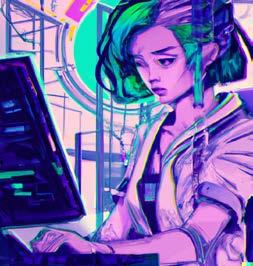
11 minute read
Exploring the Future of Engineering
A Conversation with Ole Haaland
Tell us how you’re incorporating generative AI into your work?
Advertisement
A couple of years ago I came across this generative AI tool called GitHub Co-Pilot - it’s a generative AI system which produces code in the language of your choice. I found it extremely useful, and I didn’t want to work without it. I was working in Tesla Autopilot at the time and they had a blanket ban on the tool due to security concerns. But then I started a new job, and luckily they allowed me to use it. But they wouldn’t pay for it.
I kept insisting to management that this is indeed a tool that everyone should be using. I held a presentation on the topic for my department and convinced quite a few colleagues that this is the future. However, it wasn’t until the boom of ChatGPT that my workplace actually started taking these tools seriously.
My manager decided that we needed a task force for approaching this in a system-making manner. I was approached to take part, due to my strong enthusiasm for the topic.
The task force is focused on how we can integrate these tools into the workplace. We’re trying to tackle the problems associated with tool integration and trying to understand what people think about them, what we want to do with them, and how we can use them. The goal is to reach a recommendation of the most helpful and feasible tools.
But we’re also thinking about ethical issues surrounding the use of these tools. Open-sourced solutions like Co-Pilot, or ChatGPT, require us to send all of the data to a server which is outside of our control. So we need to consider ethical questions such as: do we trust these companies with the data? Who owns the code that we generate from these tools?
What is the general perspective of generative AI in the engineering community?
A lot of engineers are quite purist, and rightfully so. They went to university, and dedicated hours of research learning to do things by hand, in an incredibly tedious way. But then, in the real world, you’re usually after quick and simple solutions.
These Generative AI systems can produce a lot of what engineers have spent hours and hours learning in the blink of an eye. And I think a lot of engineers are skeptical about it – they don’t really want to embrace it.
So part of the work I’m doing involves, not just finding the right tools, but convincing people that they should use them.

How do you see the role of engineers changing in response to the increased use of generative AI?
I think there are two core aspects to think about here. First, many of the skills we care about aren’t relevant to our work yet. Second, creativity and system thinking will become our most important skills.
So number one is that certain skills might become less needed in the future. At school, spelling and grammar are taught as essential skills in life. Doing well at school, and even passing our exams required us to be good at it. But this might change when generative AI is fully integrated into our lives. Knowing these small nitty gritty details will probably be much less important in the future.
And this goes for legal professionals and programming too. You don’t need perfect spelling because you can just put broken text into Chat GPT and get perfectly corrected text. So many of these skills that you’d need a high level of precision for might not be needed anymore.
But we should keep in mind that these tools aren’t perfect. It’s not just like you can take these tools and make whatever you want. These tools lack the same understanding that engineers have, so they are prone to making the same error again and again. I think this severely cripples ChatGTP’s ability to automate your programming job. Without the ability to correctly respond to and resolve errors, there is simply no way for this system to take your job. Someone still needs to understand what is going on. This is why I think these tools will benefit creative people with the ability to understand complex problems.
I think the role of the engineer in the future should be seen more as a composer. Or at least more as a composer than an individual musician. While the individual musician focuses on the small details, the composer focuses on how the whole comes together, they’re working at the level up. For the past 50 years, computer engineering has been changing constantly. At each stage of development it’s become more and more high-level - more abstract. Back in the day, we were creating programs by hand, by using punch cards, and then feeding them into the computer. Many of us were still obsessed with single lines of code, asking how we’d format them. But all of that has now gone out the window. The more and more efficient the programming languages, the less work you have to do. From this perspective, ChatGPT is just a case of tool progression. So, yes, ChatGPT is revolutionary, but it can also be seen as another example of us being able to work at a higher level, where yet more details are abstracted away.
It might feel revolutionary, but we still require an engineer to understand what’s going on. Who knows what it’ll be like in 20 years, but I think it’ll be fascinating to see.

What does the integration of these tools mean for human collaboration?
A lot of the time you just need to know where to look, and how to look for it. And I guess things have already changed in some way. Way back we used to ask stupid questions to our friends, but now we are addicted to the “google it” mentality. But even with google some people are better at finding results than others. And the same is true for prompting ChatGTP in an efficient way. If you don’t know the right question, then you won’t get the right answer.
These tools won’t necessarily solve all your problems, you might need help seeing it from a different perspective.
While ChatGPT will be a valuable tool for that. I still think human collaboration will be necessary. My personal hope is that these tools will make it easier for us to collaborate, instead of discouraging it. I think and hope that these tools will be used in a way that leaves less admin work for us and more time to discuss what we actually care about.
These tools may potentially enhance our communication in the future. For instance, consider an existing email feature that detects and pauses an emotionally charged message before it is sent. Such tools effectively facilitate civil discourse within organizations by promoting better phrasing and tone. Humans can be very rash people, we tend to offend each other and start pointless conflicts. On the other hand, ChatGTP is incredibly averse to conflict and would therefore be a great moderator. So in this way, generative AI might actually aid collaboration.
What other positive implications do you see with generative AI models such as ChatGPT?
At its core, I hope these tools will be a very good positive thing, in that they’ll allow us to do less work, or more work efficiently.
Another thing is that the kind of engineering available to us might be more creative. One incredible thing about ChatGPT is how we can access knowledge without having to dig for stuff. It’s a great tool for educating yourself, and this isn’t necessarily deep knowledge or understanding, but it helps anyone get their foot in the door for any new topic. Both experts and novices can educate themselves with ChatGPT, and this is a great thing.
I’m especially hopeful that these tools will help us manage the information overload that we are exposed to at work. We won’t have to check our emails or five different messaging platforms. Instead, information can be condensed and presented to us in an accessible and simple format.
Given your optimistic tone, I’m wondering what you see as the worst possible situation with the integration of generative AI?
My biggest worry about generative AI boils down to how powerful institutions will make use of them. The most relevant institutions for us in the West are the mega-corporations. Can we really trust these corporations to do the right things with these technologies? At the end of the day, the goal of capitalistic institutions is profit and this is sadly, often not aligned with human flourishing and happiness.
A good example of this is how the attention economy has rapidly changed our civilization. Kids are addicted to their phones and I don’t think we are too many generations away from a world looking like Wall-E. Generative AI will not exactly slow this trend, but rather help get us even more hooked. What happens when AI-generated TikTok becomes the norm? I don’t think it will look too good.
I also worry about how political institutions could misuse this technology. The ability of ChatGPT to create fake content, or fake conversations is really quite impressive. And, in the wrong hands, this capability of ChatGPT is really concerning. It could be deployed to build trust with people, surveil them or detect the possibility of crimes and things like that.
This outcome is something outside of what even George Orwell could imagine. Back in 1984, you just had a camera and a TV. But the applications you can use now to suppress people or control them are really insane.

How has the conversation progressed around generative AI within the engineering community? Is there still the initial fear that systems like ChatGPT are going to take over engineering roles?
I think initially there was a very big hype around it, which is natural. And then there was a sobering period after a couple of weeks, in which people started noticing the flaws in these products. The biggest one is its veracity. Say, you can ask ChatGPT to add 4 and 4 together and it can give you the wrong outcome. Where a 20-year-old calculator would give you the perfect answer.
I wouldn’t be scared – not right now – there are for sure reasons to be scared, and a lot of traits and skills will become redundant, but I don’t think we should fear becoming completely redundant. Yes, ChatGPT can do certain things a hundred times faster than I can. But I don’t think we should be scared of this. It just means that we have to rethink what work is and how we do it. And to me, that’s freedom. I can make more things in a shorter amount of time.
I understand that I have a very optimistic perspective, a lot of people have a much darker take on things. If you are hyper-specialised, and not planning on learning something new over the next 20 years, then yes, I’d be incredibly scared about my future career if I were you. But, if you’re open to new avenues, and doing new things, then I don’t think you need to be scared, you should embrace the change.

What would you want to say to a fellow engineer who has a more pessimistic view about the change that’s occurring in your profession right now?
For someone who is just coming into the industry, I’d encourage them to adapt, change, and understand the aspects of their role that will change quickly. However, those of us with longterm memory will remember that this has been said many times before. Embracing change has been a winning trait for many years.
And don’t give up on trying to understand things deeply. These tools are exactly that – tools –you shouldn’t be relying on them to pass your exams and to get by in life. Understanding is key to solving novel problems and that is what engineering is all about. If you lose out on this skill then you will lose in the job market. Use ChatGTP to make yourself smarter, not dumber.
For those who are more skeptical. Enjoy doing the boring stuff, the rest of the world will not be waiting around.

Image generated using DALL-E 2
Prompt: a cyberpunk illustration of a coder creating a new AI system, digital art










